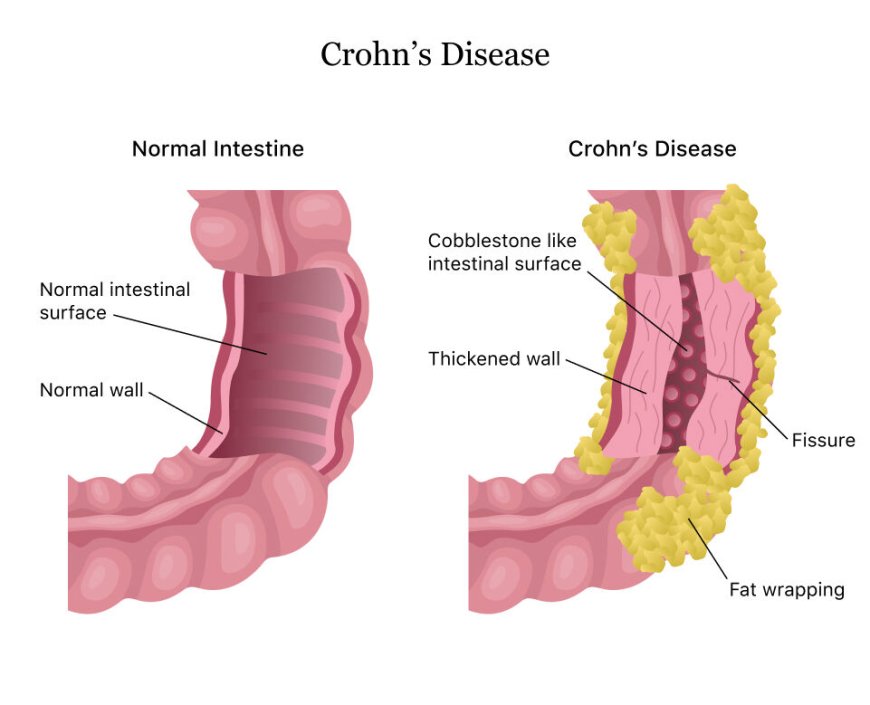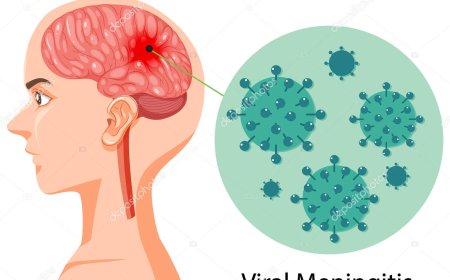Crohn's Disease

Introduction :
In this article, we'll embark on a journey to understand Crohn's disease, a condition that affects some people in India. We'll explore what Crohn's disease is, its signs and symptoms, causes, risk factors, types, diagnostic tests, treatments, complications, and prevention techniques, all explained in simple language for our 10-year-old readers.
Signs and Symptoms:
Crohn's disease can be like an unexpected roadblock in the tummy, causing discomfort and tummy troubles. Some common signs and symptoms of Crohn's disease include:
- Frequent stomach pain or cramps, like having a tummy ache that doesn't go away.
- Diarrhea or passing stools more often than usual.
- Feeling tired and weak, like our body needs more rest.
What is Crohn's Disease? :
Crohn's disease is like an uninvited guest in the tummy that causes inflammation and makes it hard for the tummy to work smoothly.
How Is Crohn's Disease Classified? :
Crohn's disease can be classified based on where it affects the digestive tract and how severe it is. This helps doctors understand how to treat the disease better.
Causes and Triggers:
The exact causes of Crohn's disease are not fully understood, but it can be triggered by different things. For example:
- Our body's immune system may mistakenly attack the healthy parts of the tummy.
- Eating certain foods might trigger tummy problems for some people.
Risk Factors with Examples:
Certain factors can increase the chances of a person having Crohn's disease. For example:
- If someone in the family has Crohn's disease, other family members might have a higher risk too.
- People who don't eat healthy food or who are stressed may have a higher risk of tummy troubles.
Types of Crohn's Disease:
Crohn's disease can affect different parts of the digestive tract. Some common types are:
- Ileocolitis: This type affects the last part of the small intestine and the first part of the large intestine.
- Gastroduodenal Crohn's disease: This type affects the stomach and the first part of the small intestine.
Diagnostic Tests and Their Use:
To diagnose Crohn's disease, doctors may use different tests to check the tummy and find out what's going on inside. Some common tests include:
- Blood Tests: These tests check for signs of inflammation and other clues.
- Colonoscopy: This is a special test where a tiny camera is used to see inside the tummy and check for any problems.
Treatments:
Treating Crohn's disease aims to reduce inflammation and make the tummy feel better. Some common treatments are:
- Medications: Doctors may prescribe special medicine to help reduce inflammation and ease tummy troubles.
- Dietary Changes: Eating healthy and avoiding trigger foods can make a big difference.
Complications of Crohn's Disease:
If Crohn's disease is not managed well, it can lead to problems like poor growth and malnutrition, making it tough for kids to stay active and strong.
Prevention Techniques:
While Crohn's disease may not always be preventable, some techniques can help manage the disease and stay healthy. For example:
- Eating healthy food with lots of fruits and veggies.
- Managing stress through fun activities and talking to loved ones.
Remember, just like how we overcome challenges in games and puzzles, with proper care and medical support, we can conquer Crohn's disease too! If anyone has tummy troubles or feels unwell, it's essential to talk to a healthcare expert who can provide the best advice and treatment. Together, we can navigate life's journey in India with strength and resilience, facing every obstacle with a smile!
What's Your Reaction?
 Like
0
Like
0
 Dislike
0
Dislike
0
 Love
0
Love
0
 Funny
0
Funny
0
 Angry
0
Angry
0
 Sad
0
Sad
0
 Wow
0
Wow
0







































































